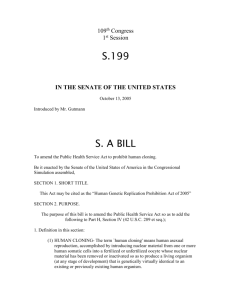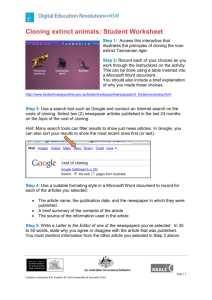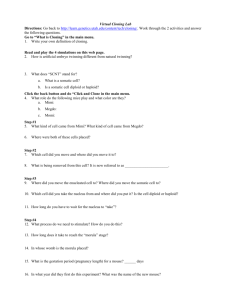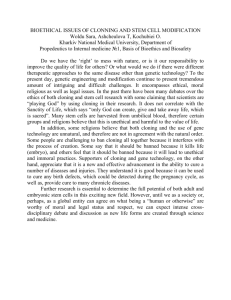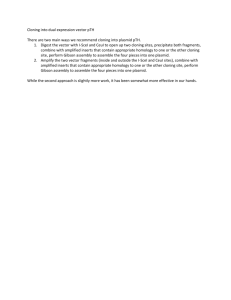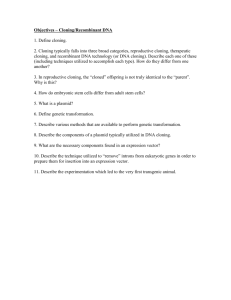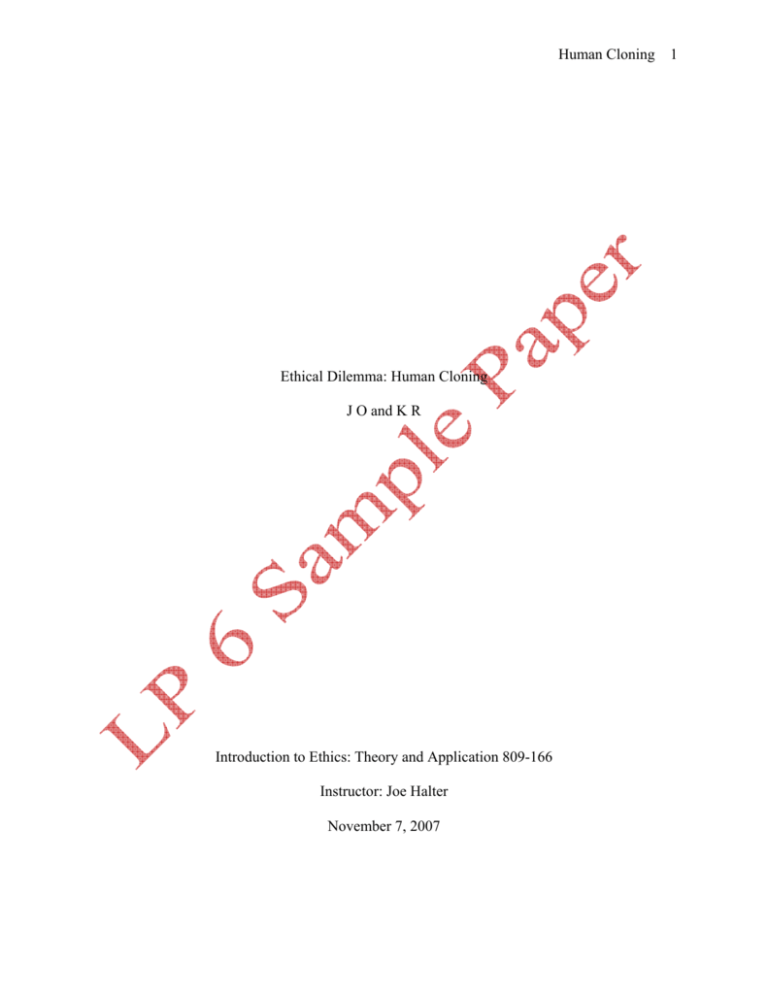
Human Cloning
Ethical Dilemma: Human Cloning
J O and K R
Introduction to Ethics: Theory and Application 809-166
Instructor: Joe Halter
November 7, 2007
1
Human Cloning
2
Ethical Dilemma: Human Cloning
Introduction
In the following paper, J will provide the pro voice; and K will be the cons voice of the
Ethical Dilemma of Human Cloning. We will do our best to provide valid evidence to support
our ideas, using unloaded language, and end with a conclusion of our final thoughts. The
following headings will be addressed following the order provided by the Scoring Guide criteria:
1. Describe Human Cloning Current ethical dilemmas.
2. Identify terms that are unclear and contested.
3. Identify facts and evidence, are from empirical data sources with research
identified.
4. State five critical thinking questions that are relevant to the ethical issue.
5. Provide three generalizations about the ethical dilemmas.
6. Cite two comparisons using the two rules for good comparisons.
7. Use one to two good arguments from correlation to cause.
8. List five, “What if,” questions pertaining to the issue.
Human Cloning – Description
Human cloning is the laboratory production of individuals, who are genetically identical
to another human being; but a clone would not be identical to the original because it would have
a different womb environment and would be brought up differently.
The possibility of human cloning, raised when Scottish scientists at Roslin Institute
created the sheep "Dolly" (Nature 385, 810-13, 1997), aroused worldwide interest and concern
because of its scientific and ethical implications. The word cloning is used by scientists to
Human Cloning
3
describe different processes for duplicating biological material. Some argue that since cloning
perpetuates life, it is not immoral.
Humans have an ethical obligation to pursue biomedical research that promises to
improve human life. Identical twins are natural clones. Reproductive cloning can be considered a
technological version of a natural process. Cloning a child could produce a tissue match for
treatment of a life-threatening disease.
Definition of Unclear or Contested Terms
1. Biomedical research – (or experimental medicine), is the research conducted to aid the body
of knowledge in the field of medicine.
2. Reproductive cloning – Reproductive cloning uses "somatic cell nuclear transfer" (SCNT)
to create animals that are genetically identical. This process entails the transfer of a nucleus
from a donor adult cell (somatic cell) to an egg which has no nucleus. If the egg begins to
divide normally it is transferred into the uterus of the surrogate mother.
3. Asexual reproduction – Is a form of reproduction which does not involve meiosis, ploidy
reduction, or fertilization. Asexual reproduction only takes one parent. Asexual reproduction
is the primary form of reproduction for single-celled organisms such as archaea, bacteria, and
protists.
4. Cloning to produce children –Somatic cell nuclear transfer (SCNT) is the process in which
the nucleus of a somatic cell of an organism is transferred into an enucleated oocyte.
"Cloning-to-produce-children" is the application of SCNT to the creation of a human being
that shares all of its nuclear genes with the donor of the human somatic cell.
5. Cloning for biomedical research – Stem cells derived from cloned human embryos
resulting from somatic cell nuclear transfer technology are promising as a potential source of
treatment in a wide range of diseases.
Human Cloning
4
6. Therapeutic cloning - makes embryos as a source of embryonic stem cells for therapeutic
purposes. Because embryonic stem cells can grow into any body cell, they might be cultured
into nerve cells, skin cells, even hair follicles for the bald. The obvious use of therapeutic
cloning would be treating deadly diseases like diabetes and Parkinson's, where a specific type
of cell has died. It's a good bet that replacing those cells would restore health.
Identify Facts and Evidence Relevant to Human Cloning
The United Nations, first to declared its support for a ban on all forms of human cloning
Sample of Standardized Clone names - attached®
A clone is identified by its microtitre plate address (plate number, row, and column) and prefixed
by a library abbreviation to produce a unique name. Standardized names should be used in all
Clone Server transactions as well as in GenBank sequence submissions.
Clone Nomenclature - Standardized clone names
Time Line on www.pbs.org/bloodlines/timeline - That gives information of the beginning of
human cloning.
®
Standardized Clone Names, in “Clone Nomenclature,” NCBI Clone Registry U.S. Department of Health and
Human Services, National Institutes of Health, National Center for Biotechnology Information, National Library of
Medicine, www.ncbi.nlm.nih.gov
Human Cloning
5
Is it morraly acceptable or morally wrong to clone
35%
%
31
%
32
%
29
%
29
%
35
30%
Clone Animals
25%
Clone Humans
20%
10%
7%
8%
7%
9%
9%
15%
5%
0%
200
1
200
2
200
3
200
4
200
5
May of Each Year
gallup.com
State Five Critical Thinking Questions
Pro Voice: 1. What will be and are current benefits of human cloning?
There are many ways in which human cloning is expected to benefit mankind.
Con Voice: 1. What will be the over all cost and pain to the human clone?
There are still many abnormalities within the technology, for every 100 experiments only one or
two, appear to produce a viable offspring in surrogate mothers.
Pro Voice: 2. Will it be possible to reverse the aging process?
Rejuvenation – Someday it may be possible to reverse the aging process.
Con Voice: 2. Are we looking for the fountain of youth? At what or whose rights will the
scientific and medical community will be exploiting: women, children, clone, and others?
Human Cloning
6
If it did offer cures that would create a market for egg donors, which would lead to the
exploitation of women, clones would be considered property of a corporation, and affect the
overall population.
Pro Voice: 3. What may be some of the therapeutic uses?
Reverse heart attacks by cloning healthy heart cells and injecting them into the damaged heart
tissue.
Con Voice: 3. Are we looking for the fountain of youth?
People can live healthier life styles today, if they choose too, that would prevent most diseases;
there is no concrete evidence that therapeutic cloning would really provide cures.
Pro Voice: 4. Can embryonic stem cell research provides possible organ and tissue donations?
Break through in embryonic stem cell research. Stem cells can be grown to produce
organs or tissues to repair or replace damaged ones.
Con Voice: 4. Are we as a community ready for this new technology and science?
Our age currently in history is the age of genetic medicine, but we must define that age with care,
restraint, and responsibility with which we take up these new scientific knowledge.″
Pro Voice: 5. May provide another form of reproduction for childless partners?
With cloning, infertile couples could have children.
Con Voice: 5. Will it provide designer Children?
Breeding humans to eliminate undesirable genetic traits – gives corporations a commercial
eugenics, reducing human life to a commodity.
Pro Voice: The above list only scratches the surface of what human cloning technology can do
for mankind. The suffering that can be relieved is staggering. This new technology heralds a
new era of unparalleled advancement in medicine if people will release their fears and let the
Human Cloning
7
benefits begin. Why should another child die from leukemia when if the technology is allowed
we should be able to cure it in a few years time?
Con Voice: Yes, it does only scratch the surface what we can do with this new technology. But
the ends do not justify the means, human cloning would be unethical because it would involve
the exploitation or destruction of human life. That is wrong life is not a commodity or a “human
invention”.
Three Generalizations about Human Cloning
1. What is cloning?
Cloning is a form of reproduction in which offspring result from the deliberate replication of the
genetic makeup of another single individual (asexual reproduction).
2. For what purposes would anyone want to perform human cloning?
One purpose would be to produce children who would be genetically identical to pre-existing
individuals. Another would be to produce cloned embryos for research or therapy.
3. Has anyone tried to perform human cloning?
Yes, but the extent to which attempts have been successful is unclear. Claims from around the
world have not been substantiated.
Comparisons/Similar case
1. A child is lost soon after birth to a tragic accident. Many parents have written the HCF after
losing a baby in a fire, car accident, or other unavoidable disaster. These grief stricken
parents often say that they would like to have their perfect baby back. Human cloning would
allow such parents to have a twin of their lost baby, but it would be like other twins, a unique
Human Cloning
8
individual and not a carbon copy of the child that was lost under heartbreaking
circumstances.
2. A woman who through some medical emergency ended up having a hysterectomy before
being married or having children. Such women have been stripped of their ability to have
children. These women need a surrogate mother to have a child of their own DNA, which can
be done either by human cloning or by in vitro fertilization.
3. A boy graduates from high school at age 18. He goes to a pool party to celebrate. He
confuses the deep end and shallow end and dives head first into the pool, breaking his neck
and becoming a quadriplegic. At age 19 he has his first urinary tract infection because of an
indwelling urinary catheter and continues to suffer from them the rest of his life. At age 20 he
comes down with herpes zoster of the trigeminal nerve. He suffers chronic unbearable pain.
At age 21 he inherits a 10 million dollar trust fund. He never marries or has children. At age
40 after hearing about Dolly being a clone, he changes his will and has his DNA stored for
future human cloning. His future mother will be awarded one million dollars to have him and
raise him. His DNA clone will inherit a trust fund. He leaves five million to spinal cord
research. He dies feeling that although he was robbed of normal life, his twin/clone will lead
a better life.
Cause from Correlation
The processes of cloning causes genetic damage in all cells, in animals, most clones die in the
womb; and those that survive to birth usually have defects of the heart, lungs, kidneys, brains or
the immune system. An expert has said that he doubts that there are any normal clones. Although
this is usually discussed in terms of potential reproductive cloning, it also applies to cloning to
produce stem cells. These cells will also have genetic damage and any tissues developed from
Human Cloning
9
them will be abnormal. It is appropriate for those concerned about cloning to remind the nation
that the much-discussed benefits would include damaged genetic material.
“What if?”
1. What if human cloning distorts parenthood?
2. What if human cloning provides medical break through for all of society?
3. What if human cloning is unethical in the view point of the medical community and what
there moral and values are concerning human life and human dignity?
4. What if the era of human cloning might not last long, maybe it’s a fad?
5. What if human cloning would violate the dignity of children?
Due to the inefficiency of animal cloning (only about 1 or 2 viable offspring for every 100
experiments) and the lack of understanding about reproductive cloning, many scientists and
physicians strongly believe that it would be unethical to attempt to clone humans. Not only do
most attempts to clone mammals fail, about 30% of clones born alive are affected with "large
offspring syndrome" and other debilitating conditions. Several cloned animals have died
prematurely from infections and other complications. The same problems would be expected in
human cloning. In addition, scientists do not know how cloning could impact mental
development. While factors such as intellect and mood may not be as important for a cow or a
mouse, they are crucial for the development of healthy humans. With so many unknowns
concerning reproductive cloning, the attempt to clone humans at this time is considered
potentially dangerous and ethically irresponsible.
Human Cloning 10
References
Appleyard, Bryan. (March 4, 2006): p28 (1) Copyright 2006 The Spectator Ltd. (UK). Spectator
300.9265. “Design Fault, attempt to transcend human nature by tinkering with embryonic
genes is doomed to failure.” (Sex and Society)
AMA Science, Human Cloning, American Medical Association, Copyright 1995-2006 by AMA.
http://www.ama-assn.org
Best, Megan. “Human Cloning is Unethical.” San Diego: Greenhaven press, 2005.
Bloodlines Timeline by PBS. http://pbs.org/bloodlines/timeline/text
Biomedical research. (n.d.). Retrieved November 5, 2007, from
http://en.wikipedia.org/wiki/Biomedical_research
Bush, George, W. US President, “Both Human Reproductive Cloning and Therapeutic Cloning
Should be Banned.” Contemporary Issues Companion: Detroit: Greenhaven Press,
2006.
“Cloning Humans,” in “Moral Issues,” Poll Topics and Trends, The Gallup
organization, 2005, http://www.gallup.com/poll (accessed March 7, 2005) Copyright
2005 by The Gallup Organization. Statistical Chart information based upon.
Eibert, Mark. “Is a ban on Human Cloning Constitutional?” Contemporary Issues Companion:
San Diego: Greenhaven Press, 2000.
Friend, Tim. “The real face of cloning.” USA Today, health science article/20030126.htm
Retrieved on October 17, 2007. http://usatoday.com/educate/college
Gerdes, Louise, “Human Cloning will harm Society.” San Diego: Greenhaven Press, 2005.
Human cloning. (n.d.). Retrieved October 24, 2007, from
http://en.wikipedia.org/wiki/Human_cloning
Human Cloning 11
Keeler, William. “Research into Human Cloning Should be Banned.” Medical Ethics Current
Controversies, San Diego: Greenhaven Press, 2000.
Opposing Viewpoints Resource Center [On-Line]. Moraine Park Technical College all retrieved
on October 17, 2007. http://find.galegroup.com/ The following articles:
(The Week)(Brief Article) National Review 54.4 (March 14, 2005): p8 The United Nations,
of places, might be an ethical step ahead of us on human cloning.
Roleff, Tamara. “Reproductive Cloning Demeans Human Life.” San Diego: Greenhaven Press,
2006/
Roleff, Tamara. “Cloning Research would not benefit humans.” Biomedical Ethics. San Diego:
Greenhaven Press, 1998.
Roleff, Tamara. (2006). “Laws Will Not Prevent Human Cloning.” San Diego: Greenhaven
press, 2006.
Smith, S., The benefits of human cloning. Retrieved October 24, 2007, from
http://www.humancloning.org/
Turney, J. (2000). “Cloning facts and fictions.” Opposing Viewpoints Resource Center [On-line].
Retrieved October 22, 2007, from http://find.galegroup.com/
Wheeler, Sondra. “Human Cloning will distort Parenthood.” San Diego: Greenhaven press,
2003.
Winters, Paul A, “Human Cloning Would Violate the Dignity of Children.”
San Diego: Greenhaven press, 1998.
Woodward, John, “Human Cloning Represents a Lack of Respect for Nature.” San Diego:
Greenhaven press, 2005.
State Human Cloning Laws, http://www.ncsl.org/porgrams/health/genetics Updated April
18, 2006. Source: NCSL, West Group. 2007 National Conference of State Legislatures,
Human Cloning 12
All Rights Reserved


